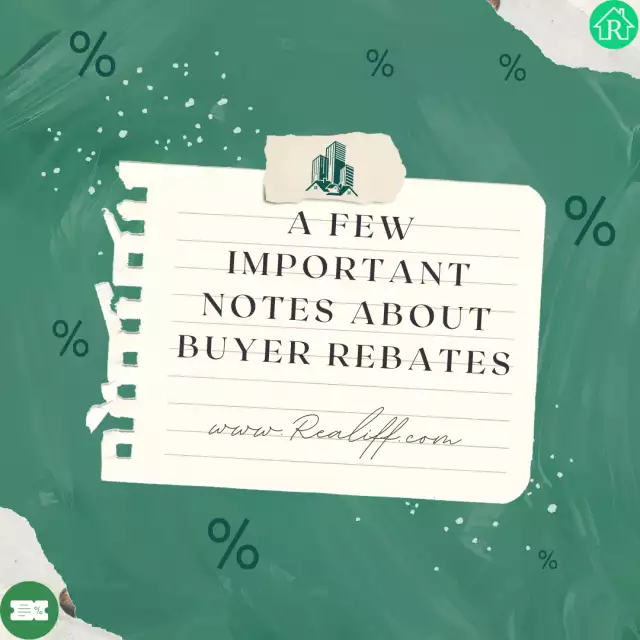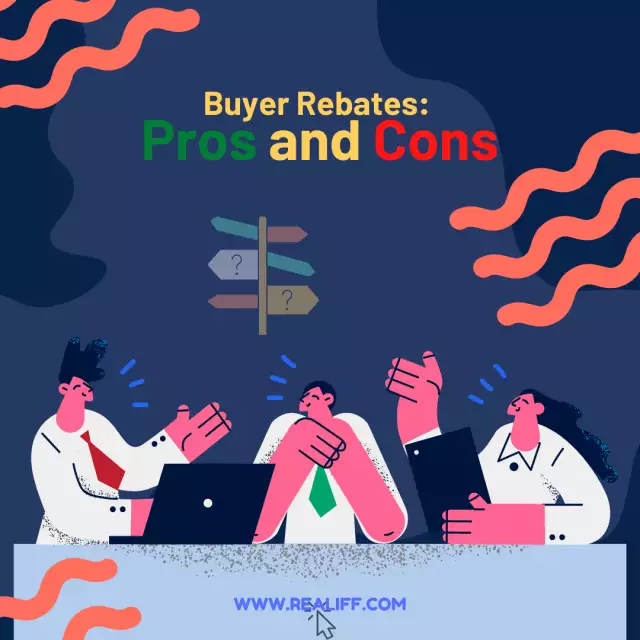A few important notes about buyer rebates
Real estate commission fees and rebates
Commission rebates are deducted from the commission charge earned by your agent on your purchase. So, in order to grasp how rebates operate, you must first understand how realtor fees work.
In a traditional real estate transaction, the seller is responsible for a total commission of approximately 6% of the final sale price. The whole commission is usually shared between the two agents participating in the transaction:
- 3% goes to the seller’s agent, for marketing the home.
- 3% goes to the buyer’s agent, for bringing their client to purchase the home.
Your rebate is a percentage of your agent's 3% commission fee.
So, if your real estate agent guaranteed you a 50% commission rebate, that would be 1.5% of the final sale price.
In the opposite case, if your agent promised you 1% of the ultimate sale price, it would be approximately 33% of their compensation.
It's critical to establish with your agent whether the rebate % they're giving applies to their commission charge or the sale price of the home. Using the $300,000 home as an example, the greater proportion does not always equal the higher rebate.
Furthermore, your lender must be informed about and authorize real estate rebates because:
- The amount of the promised reimbursement is never guaranteed in full.
- Typically, the lender determines how your rebate can be spent.
- Rebates cannot be used to pay for a down payment.
How much can you save with a home buyer rebate?
House buyer rebates might save you hundreds of dollars when purchasing a new home.
The amount you save is determined by the purchase price and the structure of the rebate.
The United States Department of Justice has a realtor rebate calculator that you can use to calculate your exact rebate amount.
Unfortunately, there are no promises about your rebate. While a company or agent may advertise a specific percentage, the lender may ultimately reduce or reject the rebate.
Cashback, on the other hand, is routed through a third party and refunded after the transaction is completed. As a result, it is usually not a problem for the lender. If you qualify for a cashback program, you will most likely receive the whole amount promised and be allowed to spend it however you see fit. For most buyers, cashback is a superior option.
Why do buyer agents provide commission rebates?
Buyer’s agents offer commission rebates to:
- Obtain and keep new customers. Buyers may be more likely to cooperate with an agent who guarantees them a refund of several thousand dollars. Furthermore, because most buyers do not sign exclusive contracts with their agents until they submit an offer, rebates provide an additional incentive for a buyer to continue with one agent throughout the process rather than browsing for houses with many brokers.
- Reduce the cost of a transaction. Closing costs might be high. Buyers often pay 3-5% of the sale price. That may be up to $15,000 on a $300,000 home. A customer who receives thousands of dollars back may be able to afford these expenditures more easily.
- Maintain your competitiveness. Buyer rebates are being offered by an increasing number of businesses. Agents may believe they must follow suit in order to avoid losing business.
How to negotiate a buyer rebate with your agent
It is possible to negotiate a buyer rebate on your own, but it is tough if the agent isn't already giving one. Instead, look for a real estate company that gives built-in rebates or cash back.
You have a better chance of securing a home buyer rebate if:
- Buying a high-priced home so your realtor will earn a hefty commission
- Working with a newer agent who may have a harder time attracting customers
- Buying and selling a home through the same agent, so they receive both commissions
- Purchasing in a low-demand location where your agent may not have much other work
Many agents are apprehensive about granting commission rebates since it implies earning less money. They may believe it is not worth their time.
How to increase your chances of a real estate rebate
To increase your chances of successfully negotiating a real estate refund with your agent, do the following:
- Help your agent out by doing some of the legwork. If you've already done the legwork of selecting a home and simply need assistance with making an offer, an agent may be willing to decrease their commission in the form of a rebate.
- Sell your home with the same agent. Because the agent will be compensated for both transactions, they may be more ready to provide a discount.
- Purchase a property that the agent is selling. Dual agency is not permitted in all states, and there is an inherent conflict of interest because the agent also represents the seller. Before committing to a dual agency sale, make sure you completely grasp the dangers!
Is it worthwhile to try to negotiate a realtor rebate?
Even if you check all of the following boxes, there is no assurance that you will receive a realtor rebate. In fact, unless your agent promotes commission rebates, they are unlikely to give up any of their earnings.
The good news is that you are not required to arrange a buyer refund on your own. Instead, you can engage with a firm like Realiff, which provides guaranteed cash back after the transaction is completed.
Unlike home buyer rebates, Realiff Cash Back is issued as a check after closing and can be spent however you see fit.
Furthermore, it is guaranteed on qualifying purchases, which means you do not have to meet lender limits as with rebates.
Where are home buyer rebates legal?
In 42 of the 50 states, home buyer rebates are authorized.
If you live in one of these states, you can work with a rebate-offering agent, try to negotiate a rebate, or engage with a company that provides rebates or cash back.
Some states limit the size and type of rebate, so make sure to check the rules in your jurisdiction.
States where home buyer rebates are banned
The real estate industry has lobbied for rebates to be prohibited in eight states, including:
- Alaska
- Kansas
- Louisiana
- Mississippi
- Missouri
- Oklahoma
- Oregon
- Tennessee
Agents cannot offer you money back or any other form of reward to induce you to employ their services in these states.
The US Department of Justice believes that prohibiting refunds raises the cost of real estate services and damages consumers. That is why it is in favor of making rebates legal throughout the country.
Buyer rebates are frequently highly regulated, even when they are lawful.
Even in states where buyer rebates are permitted, they are subject to stringent laws and regulations.
You cannot, for example, utilize a rebate to support your down payment. Your lender will have extra requirements.
Home rebates depend on your lender
Your lender has the last decision on whether you qualify for a home buyer incentive. This is due to the fact that a buyer rebate changes the cost base of your home.
What is the cost basis?
The whole amount you pay for your home is the cost basis. It covers the purchase price, closing costs, and any additional financial investments you make in the home.
Your rebate covers some of your closing costs, lowering your home's cost basis.
The cost basis is used by lenders to compute your loan-to-value (LTV) ratio, which is the amount borrowed compared to the value of your home. You can determine it by dividing your loan amount by the cost basis of your home.
If your LTV ratio changes, your lender may need to amend your financing to maintain the low ratio. Lenders like to keep the LTV ratio at 80% or lower.
Here's an example of how a $5,000 commission refund on a $250,000 home can cause your LTV ratio to be excessively high.
Failure to disclose a refund can lead to your financing falling through or, in the worst-case situation, mortgage fraud.
Cashback isn’t as regulated
When a realtor offers a buyer cash back, the rebate does not raise these concerns because it is distributed after closing. It has no effect on the cost base or the LTV ratio, hence lenders are normally unconcerned about it.
You won't be able to use it to cover closing fees, but it's a good method to replenish your bank account later.
While cash back occurs outside of the transaction and so does not fall under the jurisdiction of your lender, it is nevertheless a good practice to mention it to them just in case.
Advantages of cash back over commission rebates
Cashback is given in the form of a check after closing rather than a credit, which has several advantages.
Because you receive cash after the transaction, you are free to spend it however you see fit.
Because it comes from a third party outside of the transaction, cashback is not subject to the same rules — i.e., lender clearance.
Even so, just to be safe, notify your lender that you are receiving cash back.
Buyer rebates must be disclosed on your HUD-1 settlement form
If you receive a rebate as a closing credit, you must also mention it on the HUD-1 settlement form, which includes all settlement costs.
Your agent can assist you in determining this. Lines 204-209 provide all of the rebate information. You should also mention the name of the person who is offering the rebate, which is usually your agent and/or their broker.
Are home buyer rebates taxable?
Home buyer incentives are not taxable, according to the IRS.
This is because a rebate does not provide you with any income. It's money you already had that will be returned to you at the end of the deal.
However, real estate agent rebates may have an impact on your taxes on a cost basis. This is the total amount of money you've invested in a residence.
Taking a rebate reduces the cost basis, which may have an impact on capital gains taxes.
What are capital gains taxes?
This is the amount of taxes you pay on the rise in the value of your property since you purchased it.
A lower cost basis at the outset can make it appear as if your property gained more value than it actually did, boosting future taxes.
Nonetheless, this tax rise should be minor. You may also be entitled to an exemption on capital gains from your primary residence up to $500,000 in gains. If you are worried, consult with a tax specialist for guidance on your individual circumstances.
First-time home buyer rebates vs. regular commission rebates
First-time home buyer rebates are distinct from the realtor commission rebates discussed in this article. These refunds are provided by the state or federal governments to assist people in purchasing their first home.
The Housing and Economic Recovery Act of 2008 established a $7,500 federal tax credit for first-time home buyers, but this benefit expired in 2010.
You'll have to work a little harder now to get a tax credit, grants, or other financial aid for your first house purchase. Among the alternatives are:
- No-penalty IRA withdrawal: You can withdraw up to $10,000 from your IRA without incurring the 10% early withdrawal penalty.
- HUD grants: The United States Department of Housing and Urban Development (HUD) funds non-profit groups throughout the country that can assist you in purchasing a home provided you meet specific criteria.
- FHA loans: The Federal Housing Administration (FHA) makes FHA loans available to first-time homebuyers. These loans have a lower down payment requirement than standard loans and may have cheaper interest rates.
- State-specific programs: Each state has its own first-time home buyer assistance programs. Check with your state housing finance agency to see what options are available in your area.
You may be eligible for both first-time home buyer and regular home buyer rebates if you work with a qualified agent or real estate company.
Save on your next purchase
Rebates have the potential to save you thousands of dollars, which is fantastic. However, there are numerous red tapes to contend with, and you should not rely solely on them.
That is why it is preferable to opt for a company that offers cash back, as it is simpler and more reliable.
In any case, savings like buyer's agent rebates and cash back refunds are becoming more popular. If your state allows it, you should look for chances like these.









